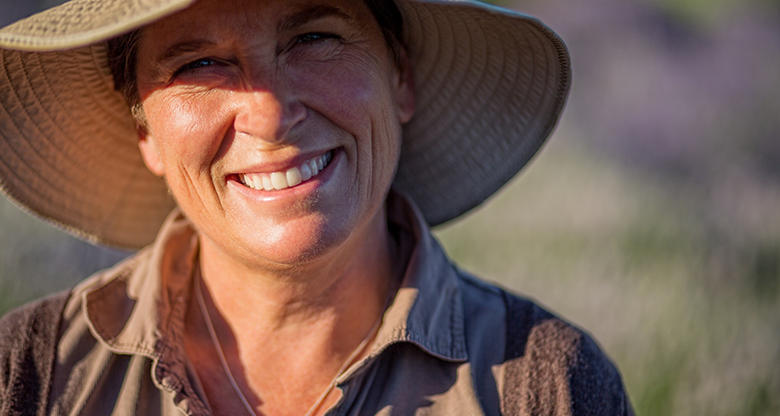Grace Brennan is the founder of Buy From The Bush, a digital marketplace that connects rural producers and retailers with global customers. The business began in late 2019 as an Instagram account showcasing items that could be bought from rural communities facing one of the worst and longest droughts on record.
Within four months, and as bushfires added to rural Australia’s suffering, the account had attracted 130,000 followers, 20% of the businesses involved had to employ more staff, 40% of businesses started shipping interstate, and 96% of those business owners were women.1
Brennan says this success speaks to the resourcefulness and resilience of communities and businesses in the bush and that’s a resource that Australia can tap into to drive economic recovery and prosperity.
“Having grown up in the city and moved to the bush, I think there’s quite a big cultural difference,” she recently told a CommBank Women in Focus event. “One of the most incredible things that I’ve absorbed moving there is the ability of rural communities to solve problems on their own.” When there aren’t specialists to help solve problems, neighbours band together to work things out.
Jillian Kilby attests to that can-do attitude. Kilby is the founder and chief executive of The Exchange – an organisation that has converted abandoned heritage buildings into inspiring regional co-working hubs. She says there’s a resilience among regional small business owners, a high percentage of which are women. “The further you go West, from regional, rural, to remote, the percentage increases further.”
Diversify to future-proof economic prosperity
Regional migration reached a five-year high2 in the March quarter, driven in part by workplaces across the country adopting remote working. The influx brings with it a range of economic opportunities as well as demand for local services.
“I think there’s been a lot of opportunity for people to be able to live in rural areas and do work that contributes to the community,” says Kilby.
“I’ve seen women in particular, start businesses out here that solve problems in the community, fill a gap, and service what was once an invisible market – The Exchange embodies that. I don’t think that’s going to change; I think that’s here to stay.”
Kilby says these changes will reshape how entire generations view life in rural communities.
“Economic diversity is so important in regional Australia because if your country town is dependent on agriculture and every small business in that country town is interdependent on agriculture and you have three or four years of drought – which we had – your whole town suffers; every small business suffers,” says Kilby.
Megan Gomez is founder and director of Rural Health Connect, an online platform that connects psychologists with patients via video in rural and remote Australia. She says population changes have created new opportunities for rural businesses and for rural communities. She says encouraging a more diverse range of small-to-medium enterprises will support sustainability and business resilience, particularly as businesses expand into new markets – from beyond Sydney and Melbourne to right across Australia and into global markets.
“A lot of really innovative businesses are coming out of rural areas, many of them driven by women,” says Gomez.
“Telehealth is just one recent advancement that has made living in rural areas more appealing. People can enjoy the benefits of living in a rural area but still access many of the services that they were used to in the city.”
Brennan adds that we need to think about rural communities as diverse places that don’t just get held up by “one or two industries”. “They are great places to live for somebody like us who might not have the capital to own … but still want to choose to be in that place.”
Value place, value gender
While the pandemic and new remote work opportunities inspired a tree change for many city workers, the flow of people shouldn’t be all one way, says Brennan. Regional and urban economies benefit from a two-way flow of diversity, particularly among small business operators. She wants being from regional Australia to be as important as being from the city.
The way these communities have been changing in terms of industry is also changing how they view traditional gender roles as new generations enter the workforce. Sallie Jones, co-founder of Gippsland Jersey, says regional Australia is making significant strides towards gender equality in the workplace.
“In rural communities, women play pivotal roles,” she says. Reflecting on more traditional gender roles of the past, she adds: “I have certainly seen a shift and I’m very grateful to my male business partner. We have equal pay and he’s so supportive of me. It gives me wings and, for him to role model that to other men, has been a very powerful thing.
“I think there is an opportunity for incredible growth, even though I think we're coming from a foundation of women working in farming businesses, family business, the women's role is a critical one, regardless of whether it's on the tools or not.”
Our experts
Grace Brennan grew up in Sydney but after falling in love with a farmer, made the move to the western plains of NSW and now lives on a sheep and cropping farm with her husband Jack and their four children, Eliza, Maggie, Charles and August.
In 2019 Grace launched Buy From The Bush, a social media campaign to support small businesses in drought-affected communities. Since then, it has grown in to a purpose driven business and online marketplace and generated about $10million for rural businesses, 96% or which are female-led. She has a background in community development and agtech and is passionate about the power of positive storytelling and community-driven change.
Grace was named by The Sydney Morning Herald as one of the nine most influential women entrepreneurs for the 2020 International Women’s Day. In January 2020, Grace was invited by the Premier of NSW, to give the Australia Day Address to the nation and in 2021 was a NSW finalist for Australian of the Year and awarded NSW Regional Woman of The Year.
Megan Gomez began her career as a journalist and spent years reporting on topics such as bushfires, floods and drought as well as the recurring issues of a lack of access to mental health services in rural areas and higher suicide rates. After moving from Victoria to Central Queensland, where driving for four hours for a one-hour appointment is not uncommon, she decided to start Rural Health Connect. The project continued to grow in scale and complexity, but by that time she was too far along to turn back.
This was all before COVID-19. Although telehealth made sense for many reasons, adoption had been slow as it required referrers (GPs), psychologists and clients to change. The pandemic and associated lockdowns fast tracked that process as people realised the benefits of delivering services online, and as adoption became widespread.
Sallie Jones is co-founder of Gippsland Jersey, an independent, farmer-owned premium milk brand that ensures farmers are paid a fair price for their milk. Sallie has leveraged her Gippsland Jersey identity and profile to help break down the stigma associated with mental health issues in the industry and the agribusiness sector in general.
Jillian Kilby is an Australian Sir John Monash Foundation Scholar with her boots-on-the-ground in regional Australia. She is unique for her regional and international experience at the intersection of infrastructure, business and public policy. Jillian is a Civil Engineer, and her first consultancy, The Infrastructure Collaborative, was established a decade ago. She is now Managing Director of The Stable Group, a consultancy firmly fixed in their pursuit to create change in Regional Australia. In 2018, she was named Agrifutures NSW/ACT Rural Woman of the Year.
In 2018, Jillian bought a 133-year-old former Post Office building in Dubbo and launched a second company, The Exchange, an innovation hub and community-first co-working space serving regional NSW. Opening in 2022, The Exchange has expanded to a second site in Narrabri, taking up home in the town’s 106-year-old Ice-works and Cordial Factory building precinct.
Jillian is a graduate of the Australian Institute of Company Directors and has been a non-executive director of the RAS Foundation, Jobs for NSW, James Martin Institute for Public Policy, sits on the NSW Council for Women's Economic Opportunity and is member of the expert reference panel for the NSW Government’s Women’s Economic Opportunities Review. Jillian has also served on several committees including The Australian American Leadership Dialogue, the NSW Innovation and Productivity Council, and the NSW Expert Road Panel.
Want to know more?
Learn more from leading industry experts about what's important to business and the economy at CommBank ForesightTM – insights for future-facing businesses.



